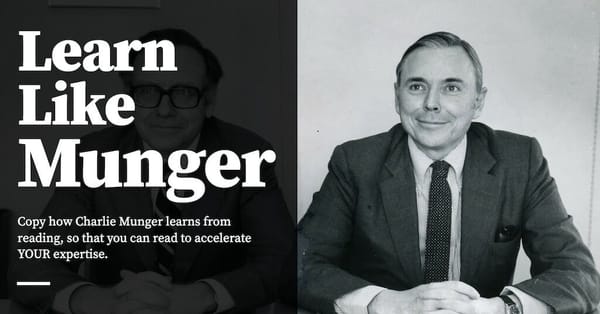How do the best investors learn from history?
Here’s a tricky problem that you may or may not have thought about: how do the best investors learn from history?
It’s widely known that Warren Buffett, Charlie Munger and other like-minded investors read a lot. It’s also rather well known that a huge portion of Buffett and Munger’s reading is dedicated to biographies. But how, exactly, do they learn from such biographies?
And while we’re at it: what exactly do they look out for when reading annual reports, trade magazines, newspaper articles, and books?
It’s not enough to say, “Ok, we should just copy what they do, and read in large quantities.” No — you need to have some understanding of how they do their learning in order to copy them.
This is made even more mysterious by the difficulties of learning from history:
- Lessons in history are path- and context-dependent. Histories are, after all, unique. What has happened once may not happen again, and definitely won’t occur in the exact same way.
- Lessons from one industry do not cleanly apply to another. Heck, lessons from one firm often do not apply to a different firm in the same industry just a few years later!
- If you want to generalise across many biographies, you’ll end up with only the most general and least useful conclusions.
The wrong answer is to try and come up with some form of generalisable ‘lesson’. Lessons don’t work when it comes to historical cases — because cases are so varied in business and in investing. You cannot generalise “do X when you see Y” if every case you will deal with is somewhat unique.
So how do we solve this? What’s the solution to this mystery?
Using the Secret
Imagine that you do know how Munger learns, though.
If you know how he learns, you’ll be able to copy him. You won’t be lost reading piles of biography before figuring it out. You’ll immediately know how to read to accelerate your expertise.
One way to get around this is to look at expertise research. If we know how experts learn, we can copy what they do in order to get better faster.
Fortunately for us, we do have a cognitive theory of expertise that tells us how experts learn from cases in domains like business and investing.
The name of that cognitive theory of expertise is Cognitive Flexibility Theory.
The following is a series of free essays to explain what the theory is, why it works, and how to use it in practice.

Cognitive Flexibility Theory (CFT)
- How To Learn From Other People's Experiences — A first attempt at explaining CFT, that quotes the original paper very closely. Fair warning: this is a fairly dense post; if you'd like a readable summary, read the next link instead.
- How Note Taking Can Help You Become An Expert — An explanation of CFT, and what it tells us about expertise in novel, ill-structured domains.
- The Principles Are Useless On Their Own — What it means if cases are more important than concepts in your domain.
- Ill-Structured Domains Aren’t Necessarily Wicked — It's important to disambiguate between wicked domains and ill-structured domains. It might not surprise you, for instance, that investing is both wicked and ill-structured, but it may surprise you that well-structured domains like medicine can both be wicked and kind.
- Cognitive Flexibility Theory: The Rules — An actionable summary to wrap up the series.
Related: Don’t Read History For Lessons — an application of all the ideas here, but on the topic of reading history.
Some External Essays about CFT
Here are two wonderful essays about CFT as applied to investing, from two investing newsletters:
- Tom Morgan’s Investing’s Big Blindspot
- Rohan Soorabathula’s On Cognitive Flexibility Theory and its Investing Implications.
New to Commoncog?
Commoncog is a publication about accelerating business expertise.
Get weekly updates on cases and join thousands of operators and investors reading our newsletter:
Test The Theory in Action
The fastest way to test the ideas of CFT, though, is to try it for yourself:
Below is a free collection of cases Commoncog has compiled about companies enjoying a Scale Economies advantage. Read through the entire sequence to see if it changes how you think about scale economies:
Scale Economies, a Case Sequence:
- Ford - A Car for Everyone — What it looked like when Henry Ford discovered the fundamental principles of scale economies ... from scratch and through trial and error.
- Netflix - Becoming a Large Movie Studio — How Netflix's pivot to content may be considered a defensive pursuit of economies of scale.
- PayPal - Poisoning the Competition — Sometimes, scale advantages can come from your position in the market, not necessarily from production unit costs.
- Texas Instruments - Inventing Learning Curve Pricing — How Texas Instruments weaponised the learning curve in semiconductor manufacturing, and then pushed it too far.
- Koufu - Feeding a Nation — Scale economies in Singapore's coffee shop and food court industry.
- Nike - Living in a Variable Expense World — What happens when something about your market forces you to spend a fixed % of sales on marketing? The result: the scale player has an ongoing advantage.
- Amazon - From Books to Everything — Why scale is such an important component of Amazon's core strategy, and why it dictates so much of what the company does.
- TSMC - Slow Dominance — Behind the scale advantage of the world‘s most important semiconductor manufacturer.
- Observations on Scale Economies — Several observations that the case writers have about the scale economies cases.
- Michael Steinhardt: The King of Block Trading — How Steinhardt, Fine, Berkowitz found a competitive advantage in the early years of hedge funds.
Now imagine how you might apply that to the rest of your reading about businesses!
Want More Commoncog?
Commoncog is a publication about accelerating business expertise.
Get weekly updates on cases and join thousands of operators and investors reading our newsletter:
Originally published , last updated .

